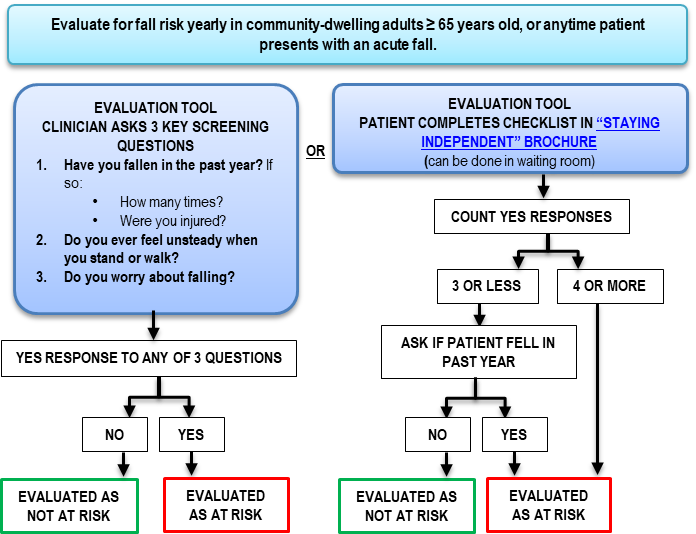How Dementia Fall Risk can Save You Time, Stress, and Money.
How Dementia Fall Risk can Save You Time, Stress, and Money.
Blog Article
All about Dementia Fall Risk
Table of ContentsNot known Details About Dementia Fall Risk What Does Dementia Fall Risk Do?Dementia Fall Risk Things To Know Before You Get ThisThe Of Dementia Fall RiskDementia Fall Risk Things To Know Before You Get This
Guarantee that there is a designated location in your medical charting system where team can document/reference ratings and document relevant notes connected to fall prevention. The Johns Hopkins Autumn Threat Evaluation Tool is one of several tools your staff can utilize to help protect against adverse clinical events.Patient drops in healthcare facilities prevail and incapacitating unfavorable occasions that persist regardless of decades of initiative to minimize them. Improving interaction across the analyzing nurse, treatment group, client, and person's most included family and friends might strengthen autumn avoidance efforts. A team at Brigham and Women's Health center in Boston, Massachusetts, sought to create a standardized autumn avoidance program that focused around improved interaction and person and family interaction.

The development group emphasized that effective execution depends on individual and team buy-in, combination of the program right into existing process, and fidelity to program processes. The team kept in mind that they are facing just how to make sure connection in program implementation during durations of situation. During the COVID-19 pandemic, for example, a boost in inpatient drops was associated with limitations in patient interaction in addition to limitations on visitation.
An Unbiased View of Dementia Fall Risk
These events are commonly considered avoidable. To implement the intervention, companies require the following: Accessibility to Loss pointers resources Autumn suggestions training and retraining for nursing and non-nursing staff, including brand-new registered nurses Nursing process that enable client and household interaction to conduct the drops analysis, ensure use the prevention strategy, and carry out patient-level audits.
The results can be highly destructive, commonly increasing individual decline and causing longer medical facility stays. One research approximated keeps raised an added 12 in-patient days after a patient fall. The Fall TIPS Program is based upon appealing patients and their family/loved ones throughout three main processes: assessment, customized preventative treatments, and auditing to make certain that clients are taken part in the three-step loss avoidance process.
The person evaluation is based upon the Morse Autumn Range, which is a verified loss risk evaluation tool for in-patient hospital setups. The scale includes the six most usual reasons clients in medical facilities drop: the patient loss background, high-risk conditions (consisting of polypharmacy), use IVs and various other external gadgets, mental standing, gait, and flexibility.
Each risk aspect relate to one or even more workable evidence-based interventions. The registered nurse creates a plan that helpful site includes the interventions and is visible to the treatment group, client, and family members on a laminated poster or published visual aid. Registered nurses create the strategy while fulfilling with the patient and the individual's family members.
How Dementia Fall Risk can Save You Time, Stress, and Money.
The poster works as a communication tool with various other participants of the individual's treatment team. Dementia Fall Risk. The audit component of the program includes examining the person's expertise of their threat aspects and avoidance plan at the unit and healthcare facility levels. Registered nurse champions perform at least 5 private meetings a month with people and their family members to examine for understanding of the autumn avoidance strategy

An estimated 30% of these drops outcome in injuries, which can range in extent. Unlike various other adverse occasions that require a standard clinical action, autumn avoidance depends highly on the demands of the client.
Not known Details About Dementia Fall Risk

Based upon auditing results, one website had 86% conformity and two websites had more than 95% compliance. A cost-benefit analysis of the Loss TIPS program in eight healthcare facilities approximated that the program cost $0.88 per individual to apply and resulted in cost savings of $8,500 per 1000 patient-days in straight costs associated to the avoidance of 567 drops over three years and eight months.
According to the technology group, companies curious about implementing the program ought to conduct a preparedness assessment and drops prevention spaces analysis. 8 Furthermore, organizations ought to ensure the required infrastructure and operations for application and establish an application plan. If one exists, the organization's Fall Prevention Task Force ought to be included in preparation.
Dementia Fall Risk - Questions
To start, companies must guarantee completion of training components by registered nurses and nursing assistants - Dementia Fall Risk. Healthcare facility personnel must examine, based on the demands of a hospital, whether to make use of a digital health document printout or paper variation of the autumn prevention strategy. Carrying out teams need to hire and train registered nurse champs and establish procedures for auditing and reporting on fall data
Staff require to be associated with the process of upgrading the operations to involve individuals and family members in the analysis and prevention plan process. Equipment needs to remain in place so that systems can recognize why a loss took place and remediate the reason. More especially, registered nurses ought to have networks to supply ongoing comments to both team and system leadership so they can adjust and improve fall prevention operations and connect systemic see here now problems.
Report this page